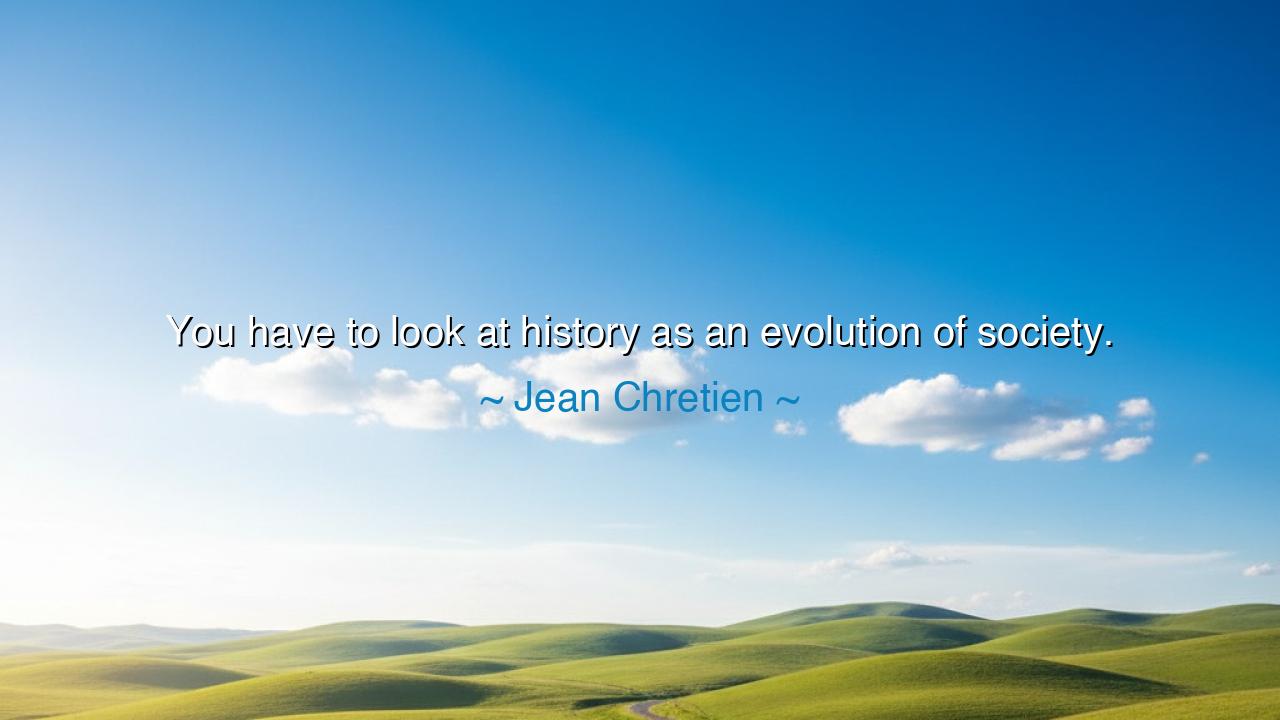
You have to look at history as an evolution of society.






In the thoughtful and steady words of Jean Chrétien, the former Prime Minister of Canada, we are reminded of one of the oldest truths of civilization: “You have to look at history as an evolution of society.” These words are simple in form but profound in meaning. They invite us to see history not as a frozen monument of facts, but as a living river, flowing through time, changing shape, and nourishing the generations that come after. Chrétien’s insight speaks to the wisdom of those who have governed, who have seen that every age inherits the imperfections of the past and must refine them through experience, compassion, and progress.
The origin of this quote lies in Chrétien’s reflections on leadership and social progress, often spoken during his years as a statesman who rose from humble beginnings to lead his country. He lived through the transformations of the 20th century—the end of colonial empires, the birth of global institutions, the rise of civil rights, and the challenges of globalization. When he said these words, he was reminding his audience that change is the law of history—that societies, like people, must grow, adapt, and learn. What was once just, may become unjust; what was once impossible, may become necessary. To understand history as evolution is to understand that progress does not come from clinging to what was, but from daring to imagine what can be.
To call history an evolution of society is to see the grand pattern in the chaos of human events. Every triumph and tragedy, every rise and fall, every war and peace forms part of an unending movement toward something greater. The ancient empires of Mesopotamia, Greece, and Rome gave way to the kingdoms of Europe; the monarchies yielded to democracy; the oppressed rose to claim their rights; the world that once accepted slavery and exclusion learned to value freedom and equality. This is not a straight or easy path—indeed, it is often written in blood and sorrow—but it is movement nonetheless. Humanity stumbles, but it does not stand still.
Consider the story of the civil rights movement in the United States. For centuries, the descendants of enslaved people struggled for equality in a nation that declared “all men are created equal.” The system resisted, the powerful clung to privilege, and yet the movement grew. The protests of Montgomery, the marches of Selma, and the voice of Dr. Martin Luther King Jr. transformed the conscience of a nation. Laws changed, hearts began to open, and though the struggle continues, society evolved. This is what Chrétien means: that history is not a cycle of repetition, but a process of awakening—a slow unfolding of human potential toward justice.
Chrétien’s wisdom also carries a warning. To see history as evolution is not to assume that progress is automatic. Evolution demands effort, vision, and courage. Societies can regress as easily as they advance; ignorance and fear can undo centuries of wisdom. When people stop learning from the past, when they mistake comfort for completion, the river of history grows stagnant. The ancients understood this well: the downfall of empires came not from weakness alone, but from pride—the belief that they had reached perfection. Chrétien calls us, instead, to humility and vigilance, to see ourselves as participants in an ongoing journey, not as heirs of a finished world.
This vision of history also demands empathy. If society evolves, then so too must our understanding of others. The beliefs and customs of past generations were shaped by their own struggles and limits. To judge them only by modern standards is to forget our own imperfection. Yet to excuse them entirely is to betray the lessons their failures have given us. The wise student of history walks a middle path—honoring the past without idolizing it, and learning from it without hatred. This is the way of true growth, both for nations and for souls.
So, my children, take this teaching to heart: look upon history not as a chain that binds you, but as a bridge that leads you forward. The mistakes of the past are not curses, but lessons; the triumphs are not relics, but seeds. Do not dwell in nostalgia, nor despair in cynicism. See yourselves as the next chapter in the long story of humankind’s becoming. Ask always: how can I make the world wiser, fairer, more compassionate than it was before? For if history is the evolution of society, then each life, each act of kindness, each moment of courage becomes part of that sacred unfolding.
And in this, the wisdom of Jean Chrétien lives on—a reminder that progress is not an inheritance, but a duty. To look at history as evolution is to see that the past is not dead—it lives within us, urging us onward. It calls us to think better, to act better, and to build a world that future generations will one day look upon and say: “They, too, helped humanity to evolve.”






AAdministratorAdministrator
Welcome, honored guests. Please leave a comment, we will respond soon